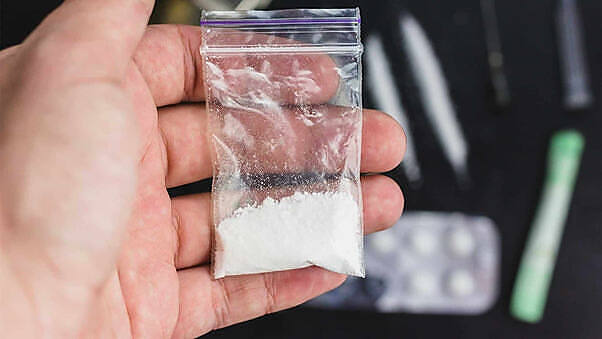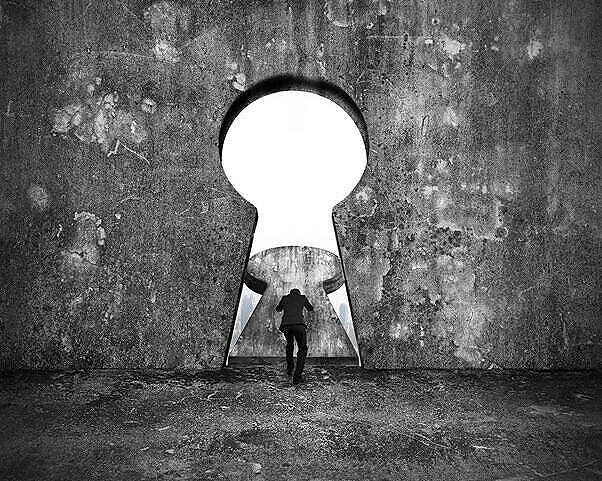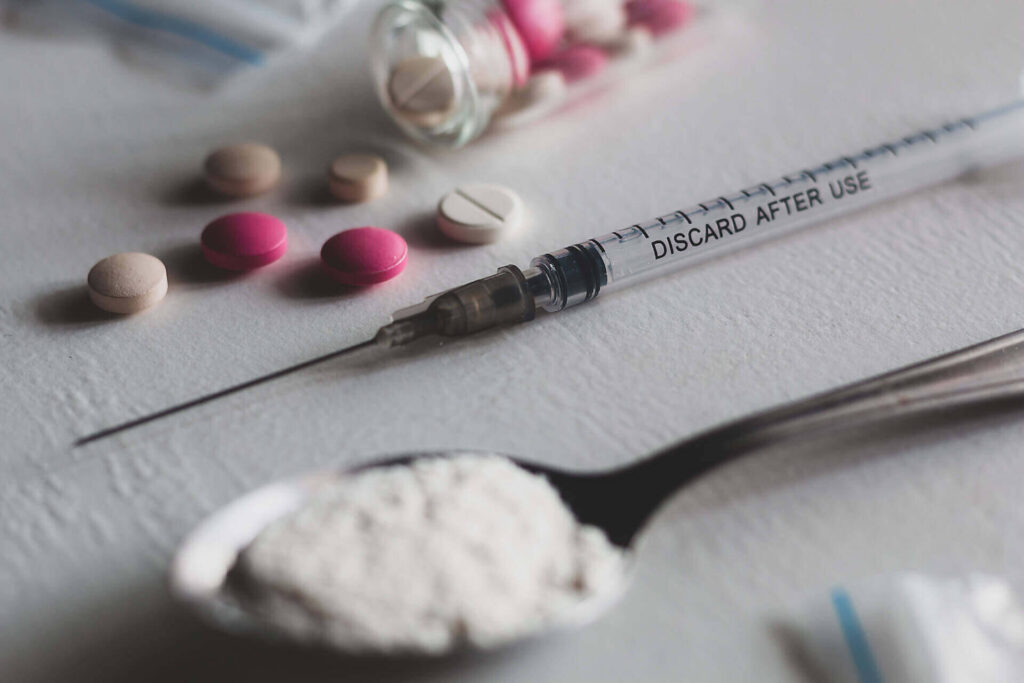Discover what ketamine addiction is, what to look out for and how our treatment approach is designed to set you firmly on the path to long-term recovery.

Ketamine is a popular recreational drug, and its use is particularly common among students, young adults and those who enjoy the party scene. As a result, there has been an increase in ketamine-related deaths, both in the UK and in the US.
Between 2019 and 2021, Ketamine poisonings in the United States increased by a staggering 81%, according to a study on calls made to poison control centres. A third of ketamine poisonings reported involved another substance such as alcohol, benzodiazepines or opioids. This alarming increase highlights the need for effective ketamine abuse treatment and prevention education.
Ketamine is a dissociative drug that is medically used for the onset and maintenance of anaesthesia. It is also used as a treatment for treatment-resistant depression and in pain management. However, ketamine has the potential for abuse and can be purchased on the streets.
Ketamine‘s hallucinogenic effects distort a person’s perception of sight and sound as well as making them feel euphoric. These effects can make ketamine addictive, especially when it is used outside of the realms of medical care.
If you suffer from ketamine use disorder, you may feel you have no one to talk to who understands. You may feel trapped and unable to see a drug-free life for yourself. We wish to reassure you that there is effective ketamine addiction help available. Here, we look at common ketamine addiction symptoms, the effects of ketamine, and the various evidence-based treatments available in a ketamine rehab facility.
The Brain And Ketamine Dependence

Ketamine is a powerful dissociative anaesthetic that can have both short-term and long-term effects on the brain and body.
When used within a medical setting, ketamine is a perfectly safe and effective tool for sedation and pain. However, when used recreationally, its effects can be unpredictable.
Ketamine hydrochloride, also known as Special K, Kit-Kat, or K, belongs to a class of drugs called dissociative anaesthetics or hallucinogenics. The effects of Ketamine can be so powerful that the user experiences a complete separation from reality, known as a K-hole. In this state, a person can take huge risks with their life.
Ketamine addiction is a serious condition that can be fatal if left untreated. Many people misunderstand addiction as a lifestyle choice. The reality is that addiction changes the brain’s pathways to compulsively seek and take a substance, prioritising it as its primary source of gratification.
These changes that occur in the addicted brain are long-lasting, and, as yet, no treatment has been found that can fully reverse it. Thankfully, undergoing treatment at a Ketamine rehab can be a truly transformative experience and help you to move forward into a life beyond addiction.
Addiction also damages the brain’s cerebral cortex, which controls decision-making, rational thought, impulsivity, and compulsivity. The cerebral cortex acts as the break between a person’s thinking and actions. When its function is impaired, a thought based on desire is more likely to become an action. The affected person will lack rational defence and control.
Common Signs of Ketamine Addiction:
- Wanting to stop ketamine but not being able to
- Continuing to take ketamine despite negative consequences to your health, occupation, social life or relationships
- Compulsively seeking and taking ketamine
- Inability to control ketamine use
- Experiencing strong ketamine cravings
- Suffering from withdrawal symptoms if you are unable to take ketamine as usual
- Feelings of guilt, shame and regret around substance use
- Ketamine is impacting your physical and mental well-being
- Others have expressed concern about your drug-taking
Total abstinence from addictive substances halts the progression of addiction. However, due to addiction’s impulsive and compulsive nature, continued abstinence is difficult to attain and maintain.
Detox Plus UK offer evidence-based treatments, inpatient programs and outpatient programs that successfully treat and manage the symptoms of ketamine addiction. If you are experiencing difficulty with controlling your ketamine use, call us for a free assessment and professional advice on your next steps.
The Effects Of Ketamine And How It Is Used
Ketamine is commonly obtained illicitly in the form of either a clear liquid or a white powder. Sometimes, ketamine is also available in capsule or pill form.
Ketamine powder is often extracted from a pharmaceutical liquid solution through evaporation. The powder is then divided into lines and snorted, much in the same way illicit cocaine is taken.
As ketamine has no taste or odour, it can also be added to drinks, food, or tobacco without a person knowing it is in there. Its effects are almost immediate.
The effects of ketamine can last for several hours, although some people can experience lingering effects for several days after taking it.
Short-Term Effects of Ketamine:
- Anxiety
- Dizziness
- Disorientation
- Euphoria
- Nausea or vomiting
- Loss of balance and motor coordination
- Increase in body temperature, heart rate and blood pressure
- Hallucinations: Dizziness, nausea, or vomiting.
- – seeing or hearing things that are not there
- Increased blood pressure, heart rate, breathing, or body temperature.
- Changes in sensory perceptions, sight, auditory, pain, etc
- Disassociation, feeling detached from yourself or surroundings
- Feeling floaty and having an out-of-body experience (also referred to as a K-hole)
The long-term effects of Ketamine are not yet fully realised. However, heavy use of ketamine is associated with Ketamine bladder syndrome. This is a very painful condition that shrinks and erodes the bladder, causing permanent damage.
Repeated snorting of ketamine can also erode nasal tissue, causing nose bleeds and inflammation. Ketamine overdose is more of a risk if you combine the drug with other substances and can cause respiratory depression and death.
Call Detox Plus UK for a free ketamine addiction assessment and information on ketamine rehab and other effective treatment options.
Who Needs Treatment for Ketamine Addiction?
Not everyone who abuses ketamine will need inpatient residential treatment to stop taking it. Most will be able to cease substance use on their own. However, a minority who suffer from addiction will not be able to control their drug use, no matter how hard they try.
If you have previously tried other methods of quitting ketamine, such as individual therapy or free local support without success, intensive inpatient treatment could be what you need. It is particularly helpful if you are unable to quit ketamine at home or have suffered repeated relapses.
Ketamine rehab provides a safe and professional environment where you can focus solely on your recovery without distraction. As well as receiving approved detox medications for ketamine withdrawal, you will undergo a comprehensive and tailored treatment plan that will enable you to live a drug-free life.
Ketamine Rehab And Dual Diagnosis Treatment
Ketamine inpatient treatment also greatly benefits those who suffer from co-occurring disorders. These are dual-diagnosis mental health conditions that co-exist with addiction.
Suffering from an underlying condition such as anxiety, depression, trauma, or PTSD can lead a person to turn to substances to alleviate distressing symptoms. Whilst substances may provide temporary relief, mental health further deteriorates over time. This often leads to a vicious cycle of taking more substances to quell an ever-worsening mental health illness.
Therapy and treatment for ketamine not only address substance use but also treat the drivers that underpin addictive disorders. By treating dual diagnosis comprehensively and simultaneously, there is a far higher chance that a person can stay free from substances once they leave the treatment environment.
Ketamine Withdrawal Symptoms
If you have been taking ketamine frequently over a prolonged period, ketamine withdrawal symptoms could cause you to continue using rather than going through a detox. Experiencing strong cravings for ketamine is a sign of addiction and is a particularly challenging symptom that can keep you trapped in the destructive cycle of addiction.
Ketamine Withdrawal Can Have Both Physical And Psychological Symptoms, Including:
- Anxiety
- Confusion
- Depression
- Ketamine Cravings
- Disorientation
- Hallucinations
- Psychosis
- Tremors
- Nausea and vomiting
- Disrupted sleeping pattern
- Excessive tiredness
- Dysphoria
Spotting When A Loved One Needs Ketamine Addiction Treatment

The signs of a Ketamine use disorder are not always easy to spot. However, as a person’s addiction progresses, symptoms become more obvious.
If you have a loved one or family member who has a problem with ketamine, knowing when to intervene can save their life.
A CQC-registered addiction rehabilitation facility will be able to take care of your loved one and assist them through ketamine withdrawal and the associated uncomfortable feelings. Furthermore, our ketamine rehabs offer trauma-informed therapy along with other evidence-based treatments to ensure a full and well-rounded recovery.
Some Warning Signs That Your Loved One Needs Ketamine Addiction Treatment:
- Using ketamine daily or going on binges (consuming large amounts of ketamine over a short space of time)
- Mixing ketamine with other substances such as alcohol or other drugs which is especially dangerous
- Isolating from family and friends
- Hiding their ketamine use or lying about it
- Changes in their appearance or personal hygiene
- Borrowing or stealing money to fund their addiction
- Loss of interest in work, socialising and hobbies
- They have needed mental health treatment since using ketamine
- They have suffered consequences as a result of their use but continue to take ketamine
- Have attempted to quit using ketamine but relapsed
Having an addiction to substance misuse is terrifying for any family member to watch. If you have already tried to speak to your loved one about their problem but have not been receptive, it may help them understand that they have an illness that can be treated.
Our professional addiction specialists are always happy to talk to family members and support them in their loved one’s journey to recovery.
How is Ketamine Addiction Treated?
If you or a loved one is struggling with ketamine addiction, call us today to start the recovery process. Our inpatient and outpatient treatment programs combine science-based treatment with the latest in cutting-edge holistic treatments.
Our ketamine rehabs are staffed by caring, compassionate, experienced addiction therapists who are dedicated to your care. We treat all manner of substance use disorders and mental health illnesses effectively and thoroughly.
Our Ketamine Addiction Treatment Programme Consists Of:
- Full Medical Ketamine Detox: The initial detoxification process will be overseen by medical professionals who will administer approved medications to minimise withdrawal symptoms.
- Comprehensive therapy programme: Our treatment programmes treat the underlying causes of addiction. Treatments include trauma-informed therapy, psychotherapy, behavioural therapies, expert 12-step treatment and individual counselling.
- Dual Diagnosis Treatment: In addition to delivering first-class substance abuse treatment, our ketamine rehabs also treat any underlying mental health illnesses at the same time. Our integrated treatment approach ensures a total and profound healing experience.
- Holistic Therapies: We offer many holistic therapies such as yoga, meditation, art therapy, fitness and mindfulness practices to teach healthy ways of healing and coping with stressful situations.
- Aftercare Support: Detox Plus UK is invested in your long-term recovery from addiction and provides ongoing support and aftercare as part of our treatment.
Medically Assisted Ketamine Detox
Medically assisted ketamine detox is a treatment plan that involves supervised administration of medication to support individuals in safely and comfortably withdrawing from ketamine use. This approach combines medicinal intervention with professional monitoring to manage withdrawal symptoms and to moderate and lessen severe the potential complications. With the guidance of healthcare professionals, patients can undergo a structured detoxification process that aims to reduce dependence on ketamine and pave the way for further addiction treatment and recovery.
Rehab Treatment for Ketamine Addiction

We understand that asking for help with any addiction is a huge and courageous step. From the very start, our experts assure you of a professional and caring approach.
Addiction is a medically recognised illness and not a moral failing. Our ketamine rehabs offer a safe and healing environment where you can focus solely on your recovery without outside distractions or stress.
If you have been suffering adverse consequences due to ketamine abuse and want to stop, we can ensure that you get the right help and support, starting with a full medical detox.
Call our friendly experts today. They are waiting to hear your story and can advise you on the most suitable treatment options according to your location, budget, and, most importantly, your individual treatment needs.


